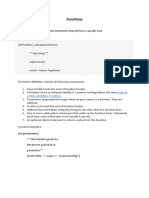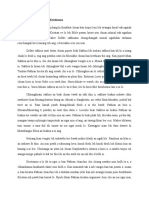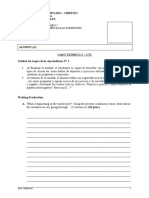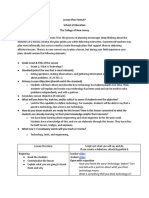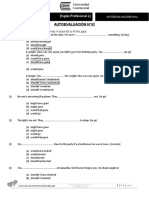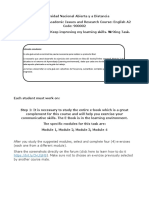TYPES OF ARGUMENTS,
SCOPE OF VARIABLES
PRE-TEST
• Write a user defined function countVowels() that accept a
string as a parameter. The function should count and display
the total number of vowels present in the given string.
Learning Objective
• To explore the concepts of different types of arguments and
scope of variables in a user defined functions.
Learning Outcome
• After the completion of the topic, students will be able to
execute python programs with user defined functions that
accepts various types of arguments.
• Also, students will be able to identify the differences between
local variable & global variables in python programs.
Types of Arguments- Introduction
Example,
def f1(x,y):
statements
f1(10,20)
• In the above example, 10,20 are actual arguments whereas, x & y are formal arguments.
• In Python, there are only 4 types of actual arguments:
*Positional Arguments
*Default Arguments
*Keyword Arguments
*Variable length Arguments
Positional Arguments
• These are arguments passed to the actual arguments of a function in correct positional order i.e.,
in the same order as in the function header.
• The number and position of arguments must be matched.
• If we change their order, the result will change.
• If we change the number of arguments ,it will result in an error.
• Example:
def subtract(a,b):
print(a-b)
subtract(100,200) gives result is -100
subtract(200,100) gives result 100
subtract(200,100,300) gives an error
Default Arguments
• It is an argument that can assign a default value if a value is not provided in the function call for that
argument.
• The value is assigned at the time of function definition by using ‘=‘ operator.
• Positional arguments must appear before the default arguments, otherwise it results in Syntax error.
• Example
def interest(principal, rate, time=15):
def interest(principal, rate=8.5, time=15): Valid Function Header
def interest(principal, rate=8.5, time): Invalid Function Header
• If we are not passing any value to argument, then only default arguments will be
considered.
• But if a value is provided in the actual argument, it will overwrite the default value.
• Example:
def fn1(name=“Anu”):
print(“Hello”,name,”Good Morning”)
fn1(“Reshma”) Hello Reshma Good Morning
fn1() Hello Anu Good Morning
Keyword(Name) Arguments
• In a function call, we can specify values for some parameters using their name instead of the
position/order. These are called Keyword Arguments or Named Arguments .
• This allows calling function with arguments in any order using name of arguments.
• Example:
def fn1(name,msg):
print(“Hello”,name,msg)
fn1(name=“Anu”, msg=“Good Morning”) Hello Anu Good Morning
fn1(msg=“Good Morning”, name=“Reshma”) Hello Reshma Good Morning
• We can use both positional & keyword arguments simultaneously.
• But first we have to specify the positional argument and then keyword argument, otherwise,
it will generate Syntax Error “Positional Argument follows Keyword
Argument.
Example:
def fn1(name,msg):
print(“Hello”,name,msg)
fn1(name=“Anu”, msg=“Good Morning”)
fn1(msg=“Good Morning”, name=“Reshma”) # Valid
fn1(name=“Ram”,”Good Morning”) # Invalid
Example
def fun(a, b=1, c=5):
print(“a is”, a, “b is”, b, “c is”, c)
fun(3)
Output : a is 3 b is 1 c is 5
fun(3, 7, 10)
Output: a is 3 b is 7 c is 10
fun(25, c=20)
Output: a is 25 b is 1 c is 20
fun(c=20, a=10) # Order doesn’t matter since we use keyword arguments
Output: a is 10 b is 1 c is 20
Points to Remember while using Keyword arguments:
• An argument list must have any positional arguments followed by keyword
arguments.
• Keywords in argument list should be from the list of parameters name only.
• No parameter should receive values more than once.
• Parameter names corresponding to positional arguments cannot be used as
keywords in the same calls.
Example
def Average(n1, n2, n3=1000):
return (n1+n2+n3)/3
FUNCTION CALL LEGAL/ILLEGAL REASON
Average(n1=20, n2=40, n3=80) Legal Non-default values provided as named
argument.
Average(n3=10, n2=7, n1=100) Legal Keyword arguments can be in any order.
Average(100, n2=10, n3=15) Legal Positional argument before Keyword argument.
Average(n3=70, n1=90, 100) Illegal Keyword argument before positional argument.
Average(100, n1=23, n2=1) Illegal Multiple values provided for n1.
Average(20, num=9, n3=11) Illegal Undefined argument num.
Variable length Arguments
• We can pass variable number of arguments to a function using ‘*’ (asterik) symbol preceded with a
variable identifier in the parameter list.
• We can call this function by passing any number of arguments including Zero.
• Example:
def sum(*n):
total=0
for i in n:
total =total+i
print(“Sum is”,total)
sum() Sum is 0
sum(20) Sum is 20
sum(20,30) Sum is 50
sum(10,20,30,40) Sum is 100
Activity
1. Which line in the given code will not work and why?
def Interest(P, R, T=7):
I=(P*R*T)
print(I)
print(Interest(20000, 08, 15)) # Line 1
print(Interest(T=10, 20000, 0.75)) # Line 2
print(Interest(5000, .07)) # Line 3
print(Interest(P=10000, R=.06, Time=8)) # Line 4
print(Interest(80000, T=10) # Line 5
Activity
2. Find the output for the following code:
def interest(prnc, time=2, rate=0.10):
return (prnc * time * rate)
print(interest(6100,1))
print(interest(5000, rate=0.05))
print(interest(5000, 3, 0.12))
print(interest(time=4, prnc=5000))
Scope of a Variable
• Refers to the part of the program where variable is recognised.
• Part of the program in which variable can be used.
• Two types of scope of variable: Local Scope & Global Scope
Local Scope:
• Variables declared inside the function definition.
• Scope is only inside that function.
• Outside function, this variable cannot be accessed.
• Example:
def fun(): Output
x=20 # Local Variable Inside Function 20
print(“Inside Function”,x) Error:name ‘x’ is not defined
fun()
print(“Outside Function”,x)
Global Scope:
• Variables declared outside the function definition are global variables.
• Scope is in the whole program.
• Global variables are accessible inside as well as outside the function.
• Example:
A=25 # Global Variable Output
def fn(): A inside Function: 25
print(“A inside Function:”,A) A outside function :25
fn()
print(“A outside Function:”,A)
• If a same variable is declared inside and outside the function, Priority will be given to local variable.
• Example:
A=30 # global variable
def fn():
A=20 # Local Variable
print(A)
print(“A inside Function”,A) # inside function, local variable is accessed.
fn()
print(“A outside Function”,A) # outside function, global variable is accessed.
Output
20
A inside Function 20
A outside Function 30
• Values of the global variable can be modified using global keyword.
• If we declare a global variable as global in function definition and then modify its value, then that
variable is assigned modified value outside the function definition.
• i.e., Change in global variable inside the function definition will reflect in outside function definition.
• Example:
A=20 #Global Variable
def fun():
global A
A=A+30
print(“A inside Function:”,A) Output
fun() A inside Function:50
print(“A outside Function:”,A) A outside Function:50
Example
B=30 # Global Variable
def fun():
global B # global keyword used
B=20
print(“B inside Function:”,B)
print(“B before Function call:”,B)
fun()
print(“B after Function call:”,B)
Output
B before Function call:30
B inside Function call:20
B after Function call:20
Difference between Local & Global Variable
S.No Local Variable Global Variable
1 It is a variable which is declared within a It is a variable which is declared outside
function or within a block. all the functions or in a global space.
2 It cannot be accessed outside the function It is accessible throughout the program in
but only within a function/block of program. which it is declared.
Activity
1. What is the output of the following code?
x=60
def f1():
global x
print(“x is :”,x)
x=10
print(“Changed global x is:”,x)
x+=5
f1()
print(“Value of x is”,x)
Activity
2. Find the output and write the local and global variables for the following code:
value=50
def display(N):
global value
value=25
if N%7==0:
value=value+N
else:
value=value-N
print(value,end=‘#’)
display(20)
print(value)
LET’S RECAP…..
• Types of Arguments in User defined functions.
• Local Scope
• Global Scope

